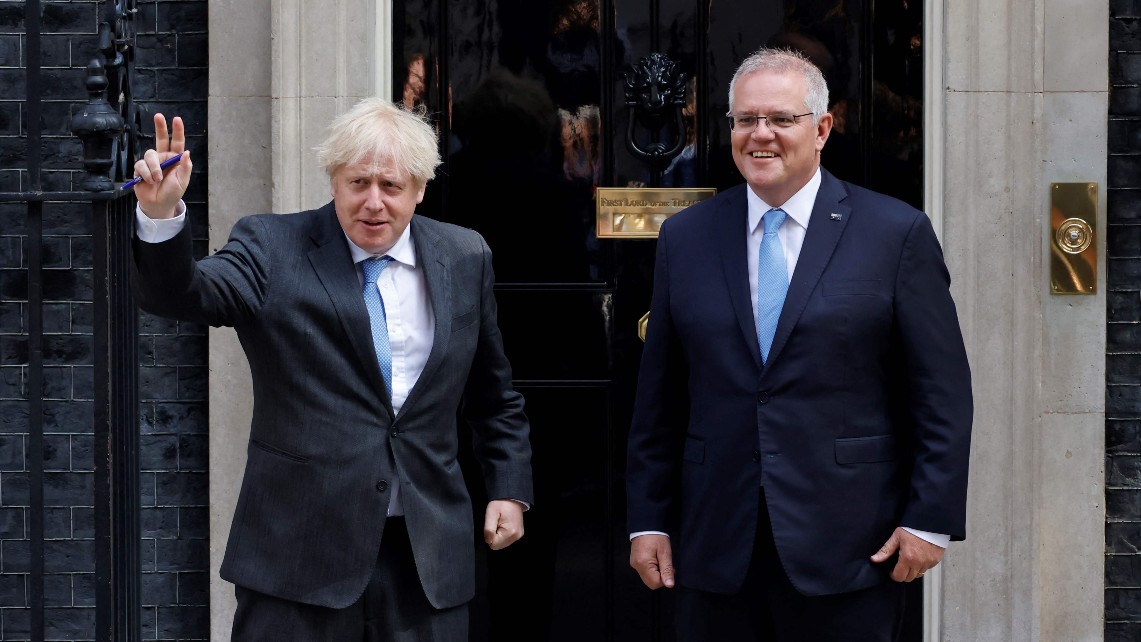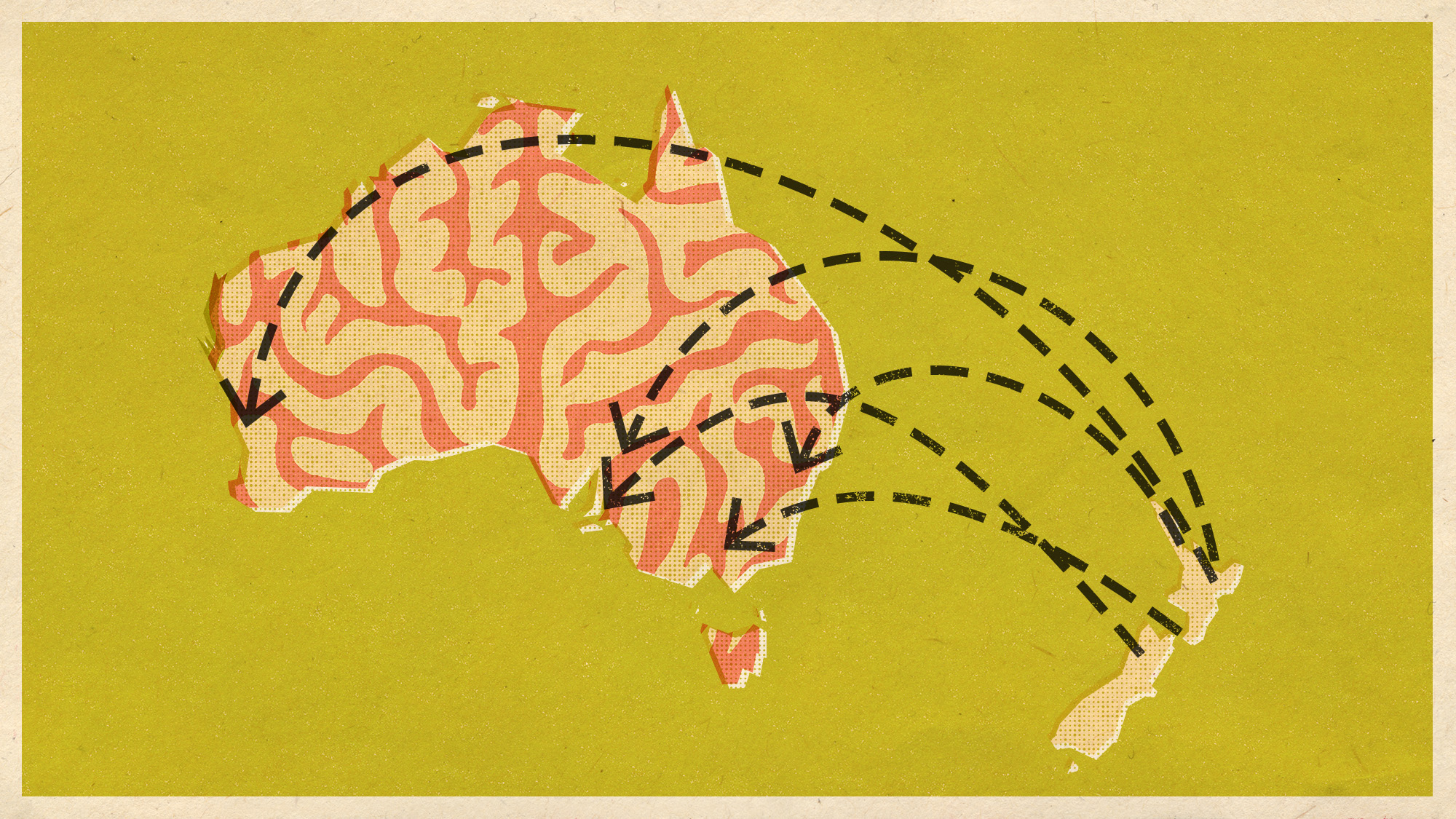What the UK-Australia deal means for future trade policy
Boris Johnson hails ‘new dawn’ in relationship between the two countries

A free daily email with the biggest news stories of the day – and the best features from TheWeek.com
You are now subscribed
Your newsletter sign-up was successful
The UK has agreed its first international trade agreement negotiated from scratch since Brexit - but not everyone is delighted by the outcome.
Boris Johnson and his Australian counterpart Scott Morrison sealed the deal “over a dinner of Scottish salmon and Welsh lamb in Downing Street on Monday”, reports The New European.
Yet while Johnson and his team are celebrating the signing, MPs and trade groups are warning that Downing Street risks setting unwanted precedents for future negotiations with other nations.
The Week
Escape your echo chamber. Get the facts behind the news, plus analysis from multiple perspectives.

Sign up for The Week's Free Newsletters
From our morning news briefing to a weekly Good News Newsletter, get the best of The Week delivered directly to your inbox.
From our morning news briefing to a weekly Good News Newsletter, get the best of The Week delivered directly to your inbox.
What’s the big deal?
The new deal is aimed at giving UK and Australian food producers and other businesses easier access to each other’s markets - with Johnson apparently giving Morrison a taster of some of the produce that Britain can offer through Monday’s dinner menu choices.
The Tory leader hailed “a new dawn in the UK’s relationship with Australia” after agreeing the pact, which Downing Street said would mean that UK products ranging from whisky and biscuits to cars will be cheaper to sell to Australia.
The UK has “signed a long list of trade deals over the past year, but they have been rollovers of those the UK already had as part of the EU”, explains the BBC. This is the first to be created from scratch.
A free daily email with the biggest news stories of the day – and the best features from TheWeek.com
Australia’s Trade Minister Dan Tehan has welcomed the new deal as a “win for jobs, businesses, free trade and highlights what two liberal democracies can achieve while working together”. As Sydney-based broadcaster ABC News notes, the UK was Australia’s “most lucrative trading market” before the former entered the European common market in 1973.
The new deal is also viewed as an important step towards the UK becoming part of a wider Asia Pacific free-trade agreement.
But critics have raised concerns about the potential impact on UK food standards and safeguards to prevent farmers being undercut by cheap imports, triggering tensions between Trade Secretary Liz Truss and Environment Secretary George Eustice.
What do MPs want?
Johnson is facing calls to give Parliament “greater powers to scrutinise and approve the UK’s international trade deals”, reports the Financial Times.
A cross-party group of more than 20 MPs wrote to Truss this week “to warn that the government risks setting precedents for future trade policy without proper debate”, the newspaper continues. Currently, the 2010 Constitutional Reform and Governance Act means Parliament only gets to scrutinise them “once the ink is on the paper”.
Labour MP Hilary Benn, who previously chaired the Brexit Select Committee, has pointed to the problems over the Northern Ireland Protocol as an example of the dangers of rushing through international treaties. The Australia deal risks setting “a significant precedent” for future deals with larger markets, said Benn, who now chairs the newly formed cross-party UK Trade and Business Commission.
Bloomberg also suggests that opponents of the Canberra deal are less concerned about the details of this particular agreement than the model it sets for talks with “other countries with even mightier farming lobbies, including the US”.
“And yet,” says the New York-based news network, “the alternative is a slippery slope to a protectionism that Britain can’t afford now that it has struck out on its own. Brexit delivered control - but for a purpose.”
-
 The ‘ravenous’ demand for Cornish minerals
The ‘ravenous’ demand for Cornish mineralsUnder the Radar Growing need for critical minerals to power tech has intensified ‘appetite’ for lithium, which could be a ‘huge boon’ for local economy
-
 Why are election experts taking Trump’s midterm threats seriously?
Why are election experts taking Trump’s midterm threats seriously?IN THE SPOTLIGHT As the president muses about polling place deployments and a centralized electoral system aimed at one-party control, lawmakers are taking this administration at its word
-
 ‘Restaurateurs have become millionaires’
‘Restaurateurs have become millionaires’Instant Opinion Opinion, comment and editorials of the day
-
 Can the UK avoid the Trump tariff bombshell?
Can the UK avoid the Trump tariff bombshell?Today's Big Question President says UK is 'way out of line' but it may still escape worst of US trade levies
-
 Five years on, can Labour's reset fix Brexit?
Five years on, can Labour's reset fix Brexit?Today's Big Question Keir Starmer's revised deal could end up a 'messy' compromise that 'fails to satisfy anyone'
-
 'Brain drain' fear as record numbers leave New Zealand
'Brain drain' fear as record numbers leave New ZealandUnder The Radar Neighbouring Australia is luring young workers with prospect of better jobs
-
 Why au pairs might become a thing of the past
Why au pairs might become a thing of the pastUnder The Radar Brexit and wage ruling are threatening the 'mutually beneficial arrangement'
-
 Brexit: where we are four years on
Brexit: where we are four years onThe Explainer Questions around immigration, trade and Northern Ireland remain as 'divisive as ever'
-
 Is it time for Britons to accept they are poorer?
Is it time for Britons to accept they are poorer?Today's Big Question Remark from Bank of England’s Huw Pill condemned as ‘tin-eared’
-
 Britishvolt: how Britain’s bright battery hope was zapped
Britishvolt: how Britain’s bright battery hope was zappedfeature Battery-making startup’s demise ‘has thrown up tales of reckless spending’ and incompetence
-
 Is Brexit to blame for the current financial crisis?
Is Brexit to blame for the current financial crisis?Talking Point Some economists say leaving the EU is behind Britain’s worsening finances but others question the data